Collective action by the agencies of the Maharashtra State Government, with support from producer collectives, have to some extent reduced the impact of Covid-19 on farmers and consumers. However, a lot more needs to be done argues Dr Sagar K Wadkar in this blog.
CONTEXT
The first case of COVID-19 was confirmed in Maharashtra State on 9 March 2020. Day-by-day the cases kept increasing and exactly after one month, i.e., on 9 April 2020, the State had 1364 positive cases against an all-India figure of 6761. Out of Maharashtra’s 36 districts, 28 districts are suffering from corona positive cases, of which eight districts are in the ‘Red Zone’. More than two-thirds of the cases in the State have emerged from the Mumbai Metropolitan Region. Unfortunately, Mumbai and Pune are among the 10 coronavirus hotspots in the country as declared by the Government of India. The State Government and its enabling agencies (including district administrations, municipal corporations, Health, Public Transport, and Law & Order Departments, civil society organisations, non-governmental organisations, etc.); different forms of producers collectives[1] (farmers’ groups, clubs, self-help groups, [dairy] cooperatives, and more importantly Farmer Producer Organisations [FPOs][2]); agritech start-ups; and farmers’ federations and their supporting organisations, are collectively addressing the menace of the Covid-19 pandemic.
CONTAINING COVID-19
On 13 March 2020, as a precautionary measure, the State declared the outbreak of this epidemic in the metropolitan cities and invoked provisions of the Epidemic Diseases Act, 1897. Following this all commercial places were shut across the State and a ban on public gatherings and events was put in place on the next day. On 23 March, the government announced curfew and border seal-off in all districts of the State, and since 25 March, a nationwide 21-day lockdown is being followed, which has now been extended by the State Government up to 30 April 2020. Unfortunately, the number of COVID-19 cases are increasing day-by-day in the State and the worst hit is the Western and Konkan region as compared to the other three regions (Khandesh, Marathwada and Vidarbha) of the State.
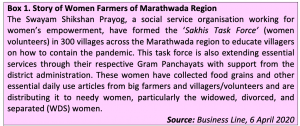
After enforcement of lockdown, migrant workers[3] began to leave for their respective districts and/or States. The government has set up 262 Relief Camps and allocated INR 45 crore for shelter and food, especially for deeply affected poor people, landless, and migrant workers. These camps are being managed and monitored by the district administration along with support from Labour and Irrigation Departments. Many of the cooperatives, SHGs (see Box 1) and Gram Panchayats are providing food services to these migrant workers. However, since the last few days, it is challenging for the district administration to maintain these people’s psychological balance arising from their lack of work and separation from their hometowns. Many other such negative effects are likely to come up in the lives of these poor, landless and migrant workers, may be across the country and the whole world as well.
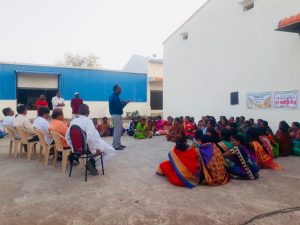
FPO members orientation for pulses procurement
Managing Essential Services
In order to put an early brake on the spread of novel coronavirus, the Hon’ble Prime Minister announced Janata Curfew on 22 March 2020, followed by 21 days lockdown up to 14 April 2020, and this has now been extended up to 3 May 2020. But there is no guarantee that by that time the situation will be under control; a strong people’s response is of the utmost need, with strong maintenance of lockdown rules and regulations, along with of steadfast social distancing.
An appeal that strategized Social Distancing as the only solution to contain the pandemic was spread across the whole country. In view of this, during the initial few days there were kiosks in all parts of the country including Maharashtra State, where people could buy articles of daily use in general, and more particularly fruits and vegetables. Further, it was also observed that in most of places, even in rural villages, most of the middlemen/vendors/stockers sold essential commodities at higher rates which led to establishing kiosk on consumers’ front as well.
COVID-19 and AGRICULTURE
On the farmers’ front, all farming operations – including procurement and marketing – abruptly stopped because of the lockdown. However, on 27 March, the government exempted all agricultural operations, agro produce marketing and its movements, harvesting activities, and procurement agencies, from the lockdown rules. In addition to this, input and fertiliser shops, and input manufacturers were also exempted, but due to fear of infection from COVID-19, the shops selling these inputs remained closed in most places. In fact, most of the wholesalers and retailers involved in these activities are also not functioning.
APMCs Markets
Initially, through the ‘Agricultural Produce Marketing Committee’ (APMC), the State Government tried to manage marketing of agro-produce to some extent. But these agencies failed miserably to put checks on people’s movement and on taking seriously the precautions of ‘social distancing’ and use of ‘mask’. Nonetheless in the few districts of Vidarbha, Marathwada & Khandesh region, where there are fewer cases of Covid-19, the APMC markets are partially open and that too for only 2-3 hours in the morning and evening, whereas in the Western & Konkan region, it was partially open during the initial 10 days of the lockdown. But with increase in positive cases, APMCs decided to completely close the market from 10 April 2020.
Collective Action
Keeping the pandemic in mind, the State Agriculture Department, Agriculture Technology Management Agency (ATMA)-Pune, Maharashtra State Agricultural Marketing Board (MSAMB), and Maharashtra Cooperative Development Corporation (MCDC), jointly initiated steps to tackle this problem through convergence of their respective roles and responsibilities.
On 20 March itself, ATMA-Pune and MSAMB approached all FPOs that are supported by their respective organisations and also those supported by SFAC[4] (Small Farmers’ Agribusiness Consortium) and NABARD across the State. As on March 2020, over 1600 FPOs are registered across the State by these supporting organisations. They were asked to share their readiness to extend services during this lockdown, with regard to commodity wise quantity available with its per kg price, expected volume of order to deliver doorstep services for providing food grains, fruits, vegetables, etc. As a result, more than 100 FPCs came forward and calculated the numbers for daily food packages, as well as the orders expected to come from people/consumers.
FPOs Marketing through Social Media Messages – Fruits and Vegetables Basket – combo packages are being sold across the State
| Sahyadri Farmer Producer Company (FPCs), Nashik
India’s leading FPC is coming up professionally with different ‘Basket Grades’ of fruits and vegetables and have established city wise dedicated teams. (Vegetables: Grade ‘A’ – 10 kg @ Rs. 550; Grade ‘B’ – 5.5 kg @ Rs. 400; and Fruits: Grade ‘A’ – 11 kg @ Rs. 850; Grade ‘B’ – 7 kg @ Rs. 400). Approximately, a total of 25 tonnes per day is being sold to Mumbai and Pune. |
Kashatkari Raja Farmer Producer Company
Vegetables basket: All fresh vegetables basket for a week @ Rs. 500/basket.
Kisan Shakti FPC, Aurangabad Supplying vegetable basket of 15 kg @ Rs. 450 to Pune market. |
To converge producers with buyers, MCDC acted as a bridging agent to bring Housing Cooperative Societies (mainly in Pune and Mumbai) and Producers Cooperative & Producers Company onto one platform for direct marketing through social media, especially WhatsApp.
In this effort Shri. Vijay Gofane, the State Coordinator of MCDC, took the lead, shared the contact details of interested FPCs with housing societies and approached the presidents/secretaries of these housing societies to discuss with their respective members – to work out the weekly quantities required of agro-produce and then got it fulfilled through any of the FPCs.
In addition to these collective efforts, individual FPOs are also marketing their produce by using social media, and a few of them have developed their own mobile apps for marketing. During this lockdown it is very convenient for them to extend Company services to consumers and thereby create a database of consumers for future use (this is highlighted in detail in AESA Blog 110).
Further, to support these essential services provider’s movement in the State, the Public Transport Department has developed a system for issuing a vehicle e-Pass through the link: covid19.mhpolice.in. In addition to this, MSAMB set up the ‘Inter-State Fruits and Vegetables Control Room’ with a toll-free number – 1800-233-0244 – to manage smooth movement and dispute settlement, if any.
As a result, 222 tonnes of fruits and vegetables have been sold during the last 15 days of lockdown by 5,030 farmers, farmers’ groups, and FPOs from 2,657 places across Pune city.[5]
State Level Producers Company and Pune Municipal Corporation
In addition to this, MAHA-FPC, a State Level Producers Company (SLPC)[6] also initiated a movement in collaboration with district administration and municipal corporations. They have developed a core team comprising of Nodal Officer, Sale Planner and Manager, Department of Agriculture, Municipal Corporation and Regional Transportation Office Coordinator, and FPCs Coordinator under the leadership of Shri. Yogesh Thorat, the Managing Director of MAHA-FPC, supported by a Chief Executive Officer (CEO), and they have successfully facilitated the smooth delivery of daily stuff to consumers across the State. As informed by Shri. Thorat, 20-25 MT agro-produce is being delivered daily to Pune and Navi-Mumbai Market with the help of Member FPOs from Ahmednagar and Pune districts.
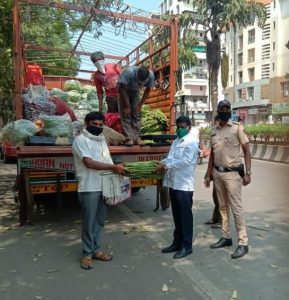
MAHA-FPC service delivery to Pune city
Prior to the lockdown, on the directives of NAFED, MAHA-FPC as a State Level Procurement Agency along with the Maharashtra State Marketing Cooperative Marketing Federations (MSCMF) and Vidarbha Cooperative Marketing Federation (VSCMF), had begun the process of farmers’ registration for the procurement of tur and chana dal at MSP rate. Initially, during the first few days of the lockdown, the procurement process got hampered, but soon after with the government granting exemptions for agri activities, MAHA-FPC decided to re-start its procurement operations partially (from their 50-55 collection centres particularly in Marathwada region out of 129 across the State) in order to give relief to member and non-member FPOs as well.
The Pune Municipal Corporation started ‘ward wise’ vegetable outlets managed by identified ‘Farmer Conveners’, (a member of any producers’ collective and/or vendor in the vicinity of Pune city) at 68 locations across 15 ward offices (3-4 outlets per ward) to provide fresh fruits and vegetables at reasonable prices. Urban consumers are also raising their individual and collective demand for food to these farmer conveners in order to get doorstep service as well.
AgriTech Start-ups
AgriTech start-ups in India are changing the landscape of Indian agriculture. These start-ups are coming up with technology-integrated platforms to address supply-demand asymmetry issues. In the backdrop of the lockdown one such start-up – AgSource: Global Agri Trade Pvt. Ltd., a joint initiative of AgSource Group’[7] and Vegetable Growers Association of India (VGAI), – began working as ‘farmers marketing and customers’ procurement arms’ to provide the best quality veggies and fruits to customers at their doorsteps. This is especially true during this lockdown period as the group is more active and vibrant and meeting the requirements of the people of the State.
As informed by Shri. Vikas Bhalerao, Founder & Chairman, AgSource, daily 200 ‘fruits and vegetables baskets’ (standard package for a week of 10-15 kg each, and customised package as well) are being delivered to housing societies in Pune and Mumbai. This WhatsApp group is not only meeting the needs of people but also creating awareness by sharing precautionary messages and images. In addition to this, there may be many more such start-ups, who come forward to create their market on one side and provide food to the needy on the other.
EMERGING CHALLENGES
The challenges faced by essential services providers, particularly FPOs (like permission for transportation, vehicle passes, availability of driver and appropriate vehicles, clearance from all checks, particularly on district boundaries and inside cities due to lockdown despite e-passes, etc.), are already highlighted in ‘AESA Blog 110’ (thus not discussed in detail here). However, the Director, Jogeshwar FPC, Akola said “The FPOs are not happy with the consumers’ treatment and response while delivering grocery, especially in high-class societies, which is not expected”.
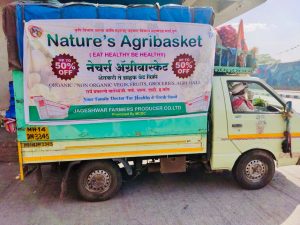 Jogeshwar FPC marketing through Nature’s Agribasket app
Jogeshwar FPC marketing through Nature’s Agribasket app
Farmers growing fruit crops (particularly grapes, pomegranate, banana, sweet lemon, mango, etc.) in the State, and those practicing floriculture are the worst affected in this crisis. As discussed with an FPO representative in Aurangabad and Jalna districts, 30-40 per cent of harvested sweet lemon and grapes marketing are being managed at the district level. The remaining 70 per cent of produce of both these fruit crops is yet to be harvested due to non-availability of labour. Similar problems are being faced by grape growers in the western region of the State. Further, in Konkan region, ‘Hapus Mango’ growers and exporters are worried about harvesting and marketing. The condition of vegetable growers across the State is also not very different, lakhs of tonnes of produce is waiting to be harvested.
In procurement activities, (though started from 50-55 centres as discussed), MAHA-FPC is facing labour and packaging material (particularly gunny bags) shortage. Despite instructions and exemption by the Government, the input industry is shut across all regions of the State, which is causing problems in getting inputs required for harvesting and post-harvest management of agro-produce. If this lockdown continues, it will create further severe problems for farmers during the up-coming kharif season.
Due to disruptions during the rabi season, farmers are likely to face cash crunch for purchasing inputs required for kharif season sowing, whereas it is likely possible that the input companies/dealers may charge high price for inputs due to the present state of affairs.
Over and above this, despite all sorts of constraints, producers’ collectives and their supporting organisations are somehow managing the delivery of essential veggies and fruits. At the village level people are scared of the coronavirus, so the Gram Panchayats’ representatives are restricting the farmers’ movement outside the village. They are not even allowing nearby villagers to enter the village, mentions a few FPO representatives. This is creating undue social pressure, apart from natural psychological stress on all essential service providers.
WAY FORWARD
During the lockdown, for effective service delivery to farmers and consumers, a Single Window System may be developed at the District/State level for giving all permissions, license to provide essential services, and for registering available stock with producers for marketing through APMC and/or directly, so that farmers and consumers movement can be managed effectively.
FPOs working in the input business,[8] especially in seed production, and equipment and implement banks, should be approached by respective district ATMA offices and Agriculture Department for extending input service delivery to farmers of the State.
Win-win situation by Integrating FPOs & AgriTech Start-ups: On one side, FPOs are demanding appropriate and advanced technology for improving efficiency of their business operations, besides technology for improving farm productivity, and on the other side, many agritech start-ups are ready with their prototypes but find no end users.
Strengthening forward & backward linkages: Agriculture is in the phase of transformation. Second generation farmers have different needs. They are more worried about ‘how to increase (their) share in the consumer’s rupee’ and ‘how to minimise cost of cultivation’. The special provisions/schemes for infrastructure development and value addition can help farmers and FPOs.[9] Financing FPOs has always been a challenge. The sensitisation of financial institutions on financing FPOs is seriously needed.
E-NAM and FPOs: In view of this pandemic, on 2 April 2020, the Ministry of Agriculture and Famer Welfare allowed FPOs to do marketing through e-NAM portal from farmgate in order to avoid overcrowding in APMC markets.[10] Since agricultural marketing is a State subject, as on date, all FPOs are waiting for the State Government’s green signal to do marketing on e-NAM portal through the respective FPOs’ collection centres. This is a major issue, thus there should be coherency between policy provisions of Central and State governments.
‘Decentralised Marketing’ is the need of the hour – to develop a resilient food value-chain system, and in practice to achieve the concept of a ‘farm to fork’ and ‘fork to farm’ approach, where producers’ collectives especially FPOs can reap benefits of the agri value chain directly. The Government of India and the respective State agricultural marketing boards – the agency responsible for issuing direct marketing license – should pay attention to this and devise a criteria for issuing direct marketing license for all FPOs across the country.
Capacity Building of Producers Collectives: Across India FPOs lack the capability to do agribusiness activities professionally. They need to be trained on the Governance, Financial Management, Business Development Plan, and Leadership aspects to run and manage FPOs effectively and efficiently, and thereby make them competitive and sustainable.[11] The Vaikunth Mehta National Institute of Cooperative Management, an apex training institute for producers’ collectives, have been undertaking such trainings for cooperatives, SHGs and FPOs.
CONCLUSION
Covid-19 and the resultant lockdown has created disruption in the global food supply system. Its impact varies considerably among different sectors and different sections of society. In agriculture, depending on the nature of the commodity and resource availability at the farm level, its impact will certainly vary. In any case, the most affected are the poorest, marginalised and disadvantaged sections of society. Apart from the agricultural sector, the labour intensive, informal sector and MSME enterprises will also get severely affected.
Extension and Advisory Services in the State need to review its current organisational and management systems and capacities at different levels so that they can support farmers in addressing the challenges emerging from COVID-19, and thus contribute to the development of a resilient food system.
EAS providers need to be properly equipped so as to address changes in the development scenario, as well as to meet the emerging demands and needs of farmers and FPOs, especially on agribusiness, value addition, and marketing. In addition to this, they need to get oriented to formation and nurturing of producers’ collectives.
EAS providers need to engage with producers’ collectives in building sustainable livelihoods, including technology integration at all levels of livelihood systems. A consortium-based approach – realised by converging the front-line and first-line extension systems along with national institutes, such as VAMNICOM, Pune; MANAGE, Hyderabad; NIAM, Jaipur; and BIRD, Lucknow – can undertake such efforts along with capacity building of producers’ collectives.
[1]A combination of producers/farmers, registered/unregistered are being used by EAS providers, development practitioners, and academia to solve common economic, social, cultural and aspirational needs of member farmers.
[2]FPOs are an informal aggregation of producers/farmers. It can be registered as ‘for-profit’ legal entity under the respective State Cooperative Societies Act and Producer Company under Section 581(c) of Indian Companies Act 1956 amended in 2002; and as ‘not-for-profit’ under Section 8 of the Indian Companies Act 1956 amended in 2013.
[3]The State has approximately 23 lakh migrants, mainly from Bihar, Gujarat, Madhya Pradesh, Rajasthan, and Uttar Pradesh States.
[4]SFAC is entrusted by the Ministry of Agriculture and Farmers Welfare to support FPO promotion across the country. NABARD is also supporting this mission of promoting FPOs. These organisations have empanelled agencies including KVKs, NGOs, CSOs and other such legal entities to promote and nurture FPOs in India. As on date, more than 7000 FPOs have been registered by these organisations, including respective State Governments and its enabling agencies, and the self-promoted ones. In view of this pandemic, it is being observed that these FPOs across the country are playing a very crucial role in delivering agro-produce at the doorsteps of consumers.
[5]Reported by the ‘Agricultural Director’, Pune, in the local newspaper – Lokmat, Pune, 13 April 2020, p. 2.
[6]SLPCs is a second-tier of FPOs Model across the country. It is an institutional arrangement to create an enabling environment for FPOs of respective States. As on date, eight such SLPCs are working across India. MAHA-FPC is first amongst them, and developed a ‘commodity wise value chain approach’ as their business strategy.
[7]AgSource Group is a pool of professionals including farmers, FPOs’ representatives, subject matter specialist and govt. officials in the field of agriculture and rural development. This strong support system established a pan-India network and is incubating agri-tech and social start-ups. The group works through WhatsApp Group named, ‘AgSource India’ (functional since 5 November, 2017), and connecting dots by helping FPOs to enhance and expand their forward linkages and connecting with buyers & sellers across the country.
[8]Devnadi Valley FPC, Sinner, Nashik; Jay Sardar FPC, Malkapur; and Shri Supo Krushi Vikas FPC, Nandura, Buldhana; and many more across the State.
[9]As of now, SFAC is providing ‘Matching Equity Grant’ @ INR 15 lakhs to eligible FPOs to increase their member farmers’ equity and credit worthiness. However, the scheme for ‘Credit Guarantee Support’ (maximum of 85%) to financial institutions is not yielding significant results because of various operational constraints.
[10]As per the State marketing provisions, the FPOs have to take their stocks to their respective APMC market and have to pay an APMC mandi fee, which varies from State to State (0.5 per cent to 2 per cent of the value of the traded produce). In Maharashtra it is 1.05 per cent of the value of the traded produce.
[11]Tripathy KK, Deshpande DV, Wadkar SK and Lokhande J. 2020. Catalysing development through collectives: Status and issues of Cooperatives, Self-Help Groups and Farmer Producers Organisations in India. Pune: WPS (VAMNICOM)-03/2020, VAMNICOM Working Paper Series.

Dr Sagar Kisan Wadkar is Assistant Professor at the Centre for Management Education, Vaikunth Mehta National Institute of Cooperative Management (VAMNICOM), Pune, Maharashtra. (Email: sagarkwadkar@gmail.com)

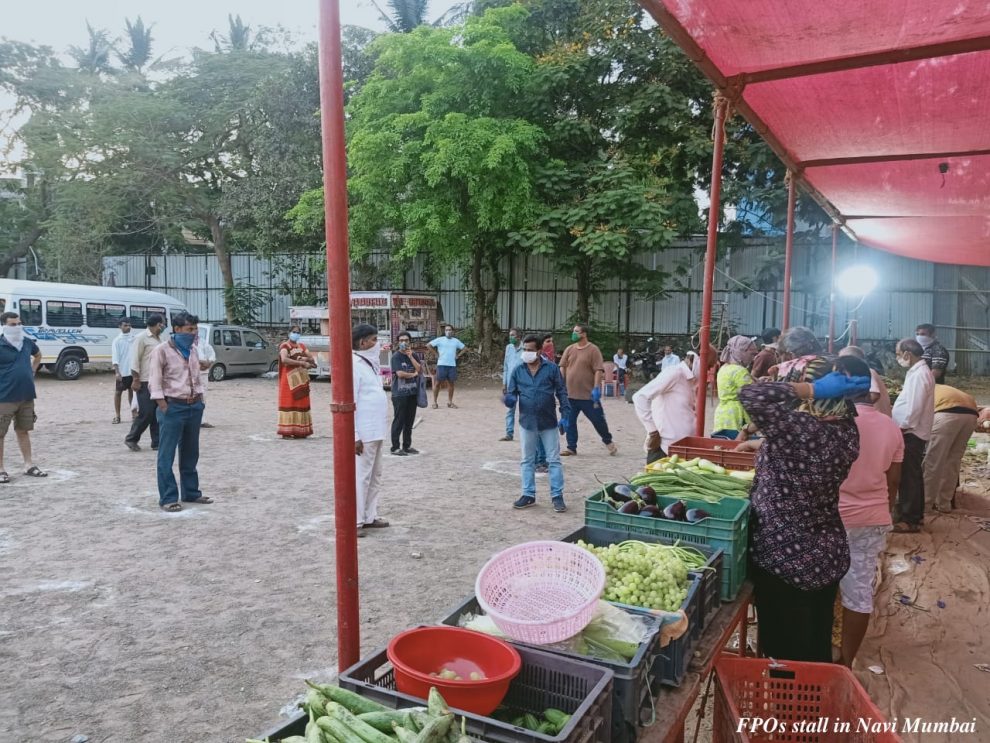

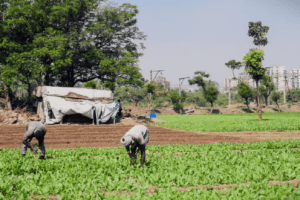

“My hearty congratulations to Dr.Sagar Kisan Wadkar on coming out with a blog on the way some of the agencies are trying hard to help the farmers in marketing their produce to the consumers during this lockdown period in Maharashtra. I have few comments to make.
APMCs are established to safeguard the interests of the farmers and today we have about 2500 APMCs in the country. But the functioning of APMCs is a matter of wide spread discussion. In this blog the author has pointed out that the APMC in Maharashtra failed miserably in following the precautions to be taken during COVID 19 and finally they were shut down wef 10th April. He also indicated, when the Dept of Agriculture and Co. approached the FPOs to extend service during lockdown, out of 1600 FPOs only 100 came forward to help the farmers. If these agencies cannot help the farmers during this hour of crisis, their existence must be questionable”.
Congratulations! Excellent write up on the FPO initiative combined with Agristartup and Government agencies to address COVID 19 challenges. The insights are instructive and suggestive of replication and faithful implementation to overcome the unprecedented crisis likely to remain with us for some more time.